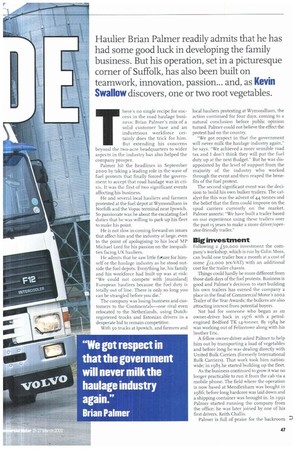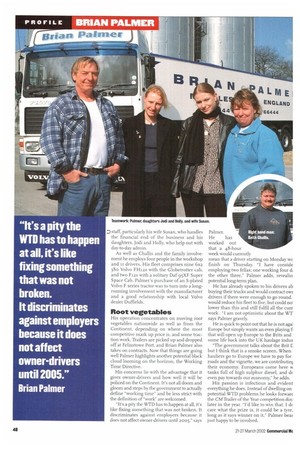Haulier Brian Palmer readily admits that he has had some
Page 47

Page 48

If you've noticed an error in this article please click here to report it so we can fix it.
good luck in developing the family business. But his operation, set in a picturesque corner of Suffolk, has also been built on
teamwork, innovation, passion... and, as Kevin
discovers, one or two root vegetables.
There's no single recipe for success in the road haulage business: Brian Palmer's mix of a solid customer base and an industrious workforce certainly does the trick for him. But extending his concerns beyond the two-acre headquarters to wider aspects in the industry has also helped the company prosper.
Palmer hit the headlines in September 2000 by taking a leading role in the wave of fuel protests that finally forced the government to accept that road haulage was in crisis. It was the first of two significant events affecting his business.
He and several local hauliers and farmers protested at the fuel depot at Wymondham in Norfolk and the Vopac terminal near Ipswich. So passionate was he about the escalating fuel duties that he was willing to park up his fleet to make his point.
He is not slow in coming forward on issues that affect him and the industry at large, even to the point of apologising to his local M P Michael Lord for his passion on the inequalities facing UK hauliers.
He admits that he saw little future for himself or the haulage industry as he stood outside the fuel depots. Everything he, his family and his workforce had built up was at risk: "We could not compete with (mainland] European hauliers because the fuel duty is totally out of line. There is only so long you can be strangled before you die."
The company was losing business and customers to the Continentals—one rival even relocated to the Netherlands, using Dutchregistered trucks and Estonian drivers in a desperate bid to remain competitive.
With 30 trucks at Ipswich, and farmers and local hauliers protesting at Wymondham, the action continued for four days, coming to a natural conclusion before public opinion turned. Palmer could not believe the effect the protest had on the country.
"We got respect in that the government will never milk the haulage industry again," he says. "We achieved a more sensible road tax and I don't think they will put the fuel duty up at the next Budget." But he was disappointed by the level of support from the majority of the industry who worked through the event and then reaped the benefits of the fuel protest.
The second significant event was the decision to build his own bulker trailers. The catalyst for this was the advent of 44 tonnes and the belief that the firm could improve on the spud carriers currently on the market. Palmer asserts: "We have built a trailer based on our experience using these trailers over the past 15 years to make a more driver/operator-friendly trailer."
Big investment
Following a i5o,000 investment the company's workshop, which is run by Colin Moss, can build one trailer box a month at a cost of some £12,000 (ex-VAT) with an additional cost for the trailer chassis.
Things could hardly be more different from those dark days of the fuel protests. Business is good and Palmer's decision to start building his own trailers has earned the company a place in the final of Commercial Motor's 2002 Trailer of the Year Awards; the bulkers are also attracting interest from potential buyers.
Not bad for someone who began as an owner-driver back in 1976 with a petrolengined Bedford TK 14-ton ner. By 1984 he was working out of Felixstowe along with his brother Eric.
A fellow owner-driver asked Palmer to help him out by transporting a load of vegetables and before long he was dealing directly with United Bulk Carriers (formerly International Bulk Carriers). That work took him nationwide: in 1985 he started building up the fleet.
As the business continued to grow it was no longer practicable to run it from the cab via a mobile phone. The field where the operation is now based at Mendlesham was bought in 1986; before long hardcore was laid down and a shipping container was brought in. In 1991 Palmer started running the company from the office; he was later joined by one of his first drivers, Keith Challis.
Palmer is full of praise for the backroom D staff, particularly his wife Susan, who handles the financial end of the business and his daughters. Jodi and Holly, who help out with day-to-day admin.
As well as Challis and the family involvement he employs four people in the workshop and it drivers. His fleet comprises nine 6x2 380 Volvo FH12s with the Globetrotter cab, and two F12S with a solitary Daf 95XF Super Space Cab. Palmer's purchase of an S-plated Volvo F series tractor was to turn into a longrunning involvement with the manufacturer and a good relationship with local Volvo dealer Duffields.
Root vegetables
His operation concentrates on moving root vegetables nationwide as well as from the Continent, depending on where the most competitive mark up price is, and some traction work. Trailers are picked up and dropped off at Felixstowe Port, and Brian Palmer also takes on contracts. Now that things are going well Palmer highlights another potential black cloud looming on the horizon, the Working Time Directive.
His concerns lie with the advantage that it gives owner-drivers and how well it will be policed on the Continent. It's not all doom and gloom and steps by the government to actually define "working time" and be less strict with the definition of "work" are welcomed.
"It's a pity the WTD has to happen at all, it's like fixing something that was not broken. It discriminates against employers because it does not affect owner-drivers until 2005," says Palmer.
He has worked out that a 48-hour week would currently mean that a driver starting on Monday we finish on Thursday. "I have conside employing two fellas; one working four d the other three," Palmer adds, revealin potential long-term plan.
He has already spoken to his drivers ab buying their trucks and would contract owl drivers if there were enough to go round. would reduce his fleet to five, but could no lower than this and still fulfil all the curr work. "I am not optimistic about the WT says Palmer gravely.
He is quick to point out that he is not agai Europe but simply wants an even playing that will open up Europe to the Brits and some life back into the UK haulage indus "The government talks about the Brit E but I think that is a smoke screen. When hauliers go to Europe we have to pay for roads and the vignette, we are contributini their economy. Europeans come here v, tanks full of high sulphur diesel, and ch even pay towards our economy," he adds.
His passion is infectious and evident everything he does. Instead of dwelling on potential yap problems he looks forwarc the CM Trailer of the Year competition din) later in the year. "I'd like to win that. I dc care what the prize is, it could be a tyre, long as it says winner on it," Palmer bear just happy to be involved.
























































































































































